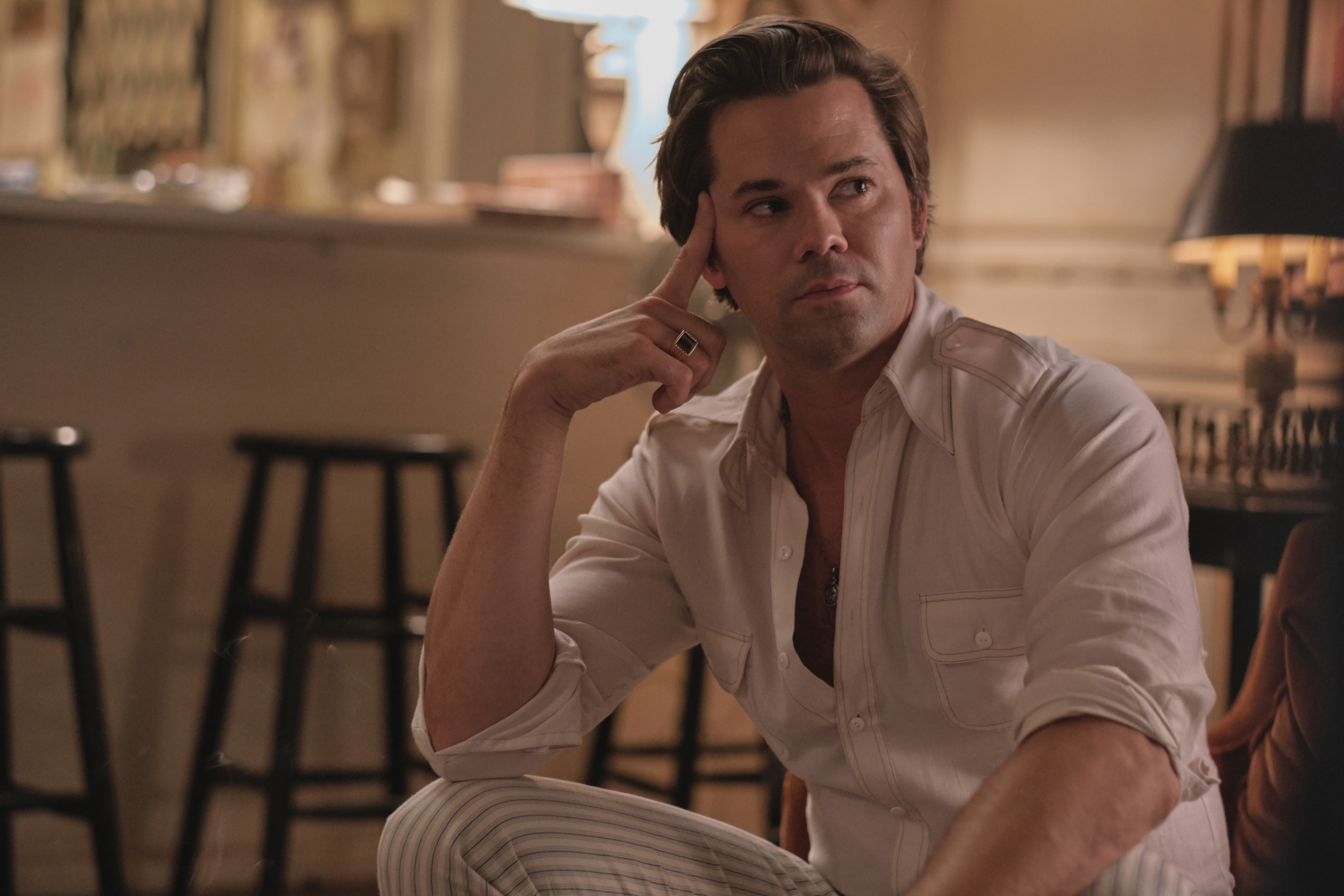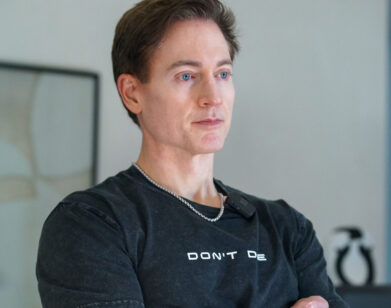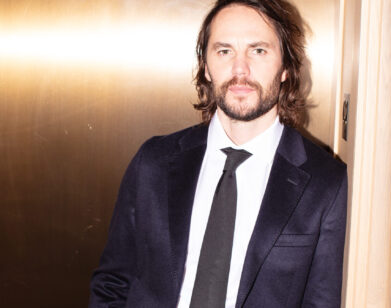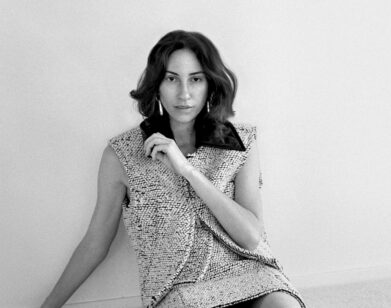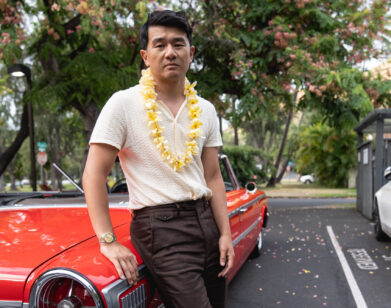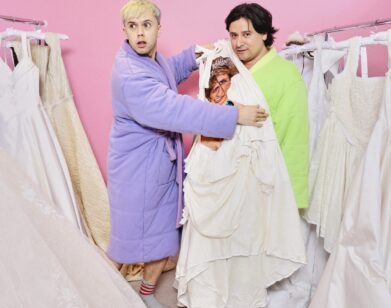friends 4 life
Andrew Rannells and Regina Hall Have a Plan to Save Broadway
Technically speaking, Andrew Rannells achieved his Broadway dreams when the actor appeared in the chorus of Hairspray in 2005. It was his biggest break yet after making a move from his hometown of Omaha, Nebraska, to New York City in 1997. It was also just the tip of the iceberg. Now 42, Rannells has seemingly done it all on stage, playing the leads in The Book of Mormon, which earned him his first Tony nomination, and in Falsettos, which earned him his second. There were roles in Hamilton, Hedwig, and Jersey Boys along the way, and it wasn’t long before Hollywood came calling. After playing Lena Dunham’s best friend Elijah through the entire run of Girls, Rannells can be seen on the debaucherous Showtime dramedy Black Monday, and can be heard as the voice of an openly gay teen in Netflix’s animated puberty romp Big Mouth. Next up, Rannells will reprise his role in the film version of The Boys in the Band, the 1968 play about a group of gay friends who reunite for one night to celebrate a birthday. The Ryan Murphy-produced adaptation will reunite Rannells with the cast of the 2018 Broadway revival, which includes Matt Bomer, Zachary Quinto, and Jim Parsons. And speaking of reunions, Rannells recently connected with his Black Monday costar Regina Hall for a conversation about keeping it together.
———
REGINA HALL: I’m going to talk about when we first met. I wonder how we should put this, because I actually laid eyes on you first, on the very first day of Black Monday on the Universal lot.
ANDREWRANNELLS: Oh, is that correct? It was raining.
HALL: That was the first day of the pilot, but when did we officially meet?
RANNELLS: It wasn’t until the first day that we worked together, which was maybe a day or two after that. It was the first time that we were actually on set together. I had that experience that sometimes you have with people: “I’m in love with her.” And Don Cheadle even said, “You two are going to be trouble.” He had just witnessed a very brief interaction, but he was like, “This is already going to be a situation.”
HALL: Was this the day with the more exotic performers in the office?
RANNELLS: Yes, we had some adult performers on set. Is that the best way to say that?
HALL: They were very comfortable in their skin. Which, I guess, would be important in that profession. But it was incredible that they were able to take that comfort out of their world and into another world with such ease.
RANNELLS: Well, none of us were showing any skin, and they were the only people who were in that position. It’s a true testament to their professionalism that they were so comfortable.
HALL: I do have to say that coming to work and seeing your face is probably one of my favorite things about doing Black Monday. I had a million favorite moments working with you, but one of them was our night scene with the pizza.
RANNELLS: That was very fun to do.
HALL: And then, of course, decad.
RANNELLS: This is what I always say about you: It can be 4:00 a.m., we’re showing up very early, and there’s always such a sense of joy. Or, it can be 2:00 a.m. and it’s the end of the night, and you still have the same sense of joy to be at work, which is so contagious. But, you mispronounced the word decade, and you said decad. We couldn’t pull it together. And it might not sound funny, but I still have the video saved in my phone. We’re pretty good about not breaking on that show. We don’t really have a lot of those moments.
HALL: We couldn’t keep it together, which was horrible because it was the last scene, and people wanted to go home.
RANNELLS: I think it was a Friday night.
HALL: You do television, movies, Broadway—do you have a favorite movie, show, or part that you’ve played, and what makes it special?
RANNELLS: It’s all sort of different muscles that you get to use. I think what we do on Black Monday is really challenging in a different way, because we’re dealing with so much material every day. I always find the hardest part about what we do on that show, what you do in television in general, is that once you finish the scene, you’re never going back to it. So, you just have to let it go. I always think of funnier things to do in the car on the way home. So that’s its own sort of skill, but its own reward when it goes well. Working on Broadway is really fulfilling in a different way because you’ve got that audience right there, you’ve got the immediate feedback, and you get the privilege and the challenge of repeating that performance every night. I think a lot of people think that it must get monotonous in some way, but it’s a really fun challenge to get to do that and to try to keep it fresh. I would love to be on stage with you. I think that would be a trip if we got to do something like that together.
HALL: We would have so much fun.
RANNELLS: We might have some problems keeping it together. We need to think of a show.
HALL: Is there a character that has been particularly challenging to portray?
RANNELLS: I did the show called Falsetto on Broadway in 2016. That was a tricky one because it was a musical that I was very inspired by as a kid, and particularly as a gay kid. It’s a story that takes place sort of at the height of the AIDS crisis, and it’s this really beautiful musical about family, chosen family, and this couple coming together in the midst of all of this. That was hard because I was intimidated by the material. Doing the play of The Boys in the Band, there was a similar fear attached to it. It’s this play from 50 years ago that people had a lot of very strong feelings about. I think we all had a little bit of the anticipation of how people were going to see it 50 years later, or see it with new eyes, obviously, for people who hadn’t seen it. It was intimidating to jump back into that.
HALL: With new eyes or bad eyes?
RANNELLS: Well, bad eyes. Because you did have that feeling that people were coming in with their arms crossed. They were like, “I don’t think I like this show.” And luckily for the most part, they left liking it. But we had a very good experience and really a warm welcome in New York, which was great. I’ll probably never have that experience again, to a year later go back and get to revive that show on film with the exact same cast. That just doesn’t happen very often. It was an exciting challenge, but also just great to see those guys.
HALL: So what about the actual movie adaptation are you most excited for the audience to see that maybe you weren’t able to do in the play?
RANNELLS: As you know, on film you get to find these smaller moments. Our director, Joe Mantello, really gave us a lot of space to explore each of our relationships with each other on a much more intimate level. Sometimes people say that the show is dark or the show is cynical, but I think they forget that this is a group of friends that really love each other. And we, as actors, all really loved each other. I think that’s what’s happening in the show a lot of times. We can be kind of short with each other and overly direct and unkind in a way. There’s this line at the end of the movie, it’s Zach Quinto’s last line that he says to Jim Parson’s character. It’s after a really horrible night of all sorts of things going on and all sorts of feelings being hurt. Harold [Quinto] says, “I’ll call you tomorrow.” It’s such a beautiful testament to all of their friendships. In spite of everything that happened and all that went wrong, they’re still going to be there for each other tomorrow.
HALL: What is the experience of entering the world of someone like a Ryan Murphy?
RANNELLS: With Boys in the Band, he called me and said, “We’re going to put together this reading to do on Broadway. These are the people that we’re asking. Joe Mantello is going to direct it.” As an actor, I got used to people saying a lot of things, and it never really happening, as in that second phone call never happens or jobs just disappear. Ryan actually does it. Then he did it again with The Prom, the movie that’s coming out later this year on Netflix that I did with Nicole [Kidman], Meryl Streep, and James Corden.
HALL: I can’t wait to see that.
RANNELLS: When he called me and said, “I want you to be in this movie The Prom. It’s a musical that was on Broadway, and we’re going to make a film version of it, and it’s you and James Corden, Meryl Streep and Nicole Kidman,” I was like, “What? What are you talking about?”
HALL: That’s what Nicole said you’re so brilliant in.
RANNELLS: Nicole has already seen The Prom? Of course, she’s already seen it.
HALL: What did you think of having the same Broadway cast play the same roles in the movie version of The Boys in the Band?
RANNELLS: It was such a dream. The Broadway run was pretty short. I think it was 12 weeks. When we ended knowing that we were going to do this film a year later, it was very exciting. It’s a very unique story in that it really only takes place on one set. So, once everyone enters, everyone is just there, and it was this really cool, very elaborate apartment that they created. Everybody’s call time was the same, and everybody wrapped at the same time. It was a very unique experience because that’s not usually how it works. I know that we are living in very uncertain times right now, but I really hope that we hear something soon about us getting reunited again.
HALL: Why is it so important for the audience for this movie to learn something regarding the LGBTQ community and its history?
RANNELLS: This was written in 1968, which was a year before Stonewall, just before the Gay Rights movement started. It’s a really interesting snapshot of what gay men’s lives were like at that time and how we’ve made huge strifes in 50 years, but things haven’t changed all that much on a human level.
HALL: To take it back to Black Monday, that is one of the things that we always find interesting on set. Even though we’re doing it very comedically, it’s like, “Gosh, this is a snapshot of the ’80s,” which isn’t that long ago. We were so unkind to people. There was this disregard. I know you published your memoir. What made you do that, especially at this time, at this point?
RANNELLS: I didn’t intend to do it. I wrote an essay for the New York Times, and then I just sort of continued to write essays, stories from early in my time moving to New York. I think you and I both had similar experiences about going to college in New York City. Being young and in that city, there’s just a lot to absorb and a lot that’s going on around you. A lot of it is from the time I moved to New York in 1997 to the time I got my first Broadway show, which I was in the chorus of Hairspray in 2005. When I got that job, it was a dream come true. That was it. I just wanted to be on Broadway. Sometimes those jobs get overlooked. People probably think my career started with The Book of Mormon, but that was in 2011, and I moved to New York in 1997. So it was like, “Well, I was still living. I was still doing things.”
HALL: Those jobs make a huge difference. They create that guy who was able to do The Book of Mormon.
RANNELLS: I feel like sometimes people get easily discouraged because they’re wanting something that they think they should have on a certain timeline. But the truth is, unfortunately, things take as long as they take.
HALL: Those years, in those jobs, is where you learn so much. You are so much better prepared. So the quantum leap isn’t always the ideal thing, even though it looks like it. I’m constantly learning. It’s like a forever school or forever class. So, what’s the worst part of being an adult?
RANNELLS: I kind of thought that there would be less anxiety as I get older. Maybe I’m doing it wrong. I find that I still have the anxiety that I had when I was younger, and I thought that would just magically go away when I turned 40, and it weirdly did not. I guess that’s the hardest part of being an adult is sometimes realizing like, “I’m an adult, but I’m still feeling like this.”
HALL: All the same feelings, double the responsibility. You’re confident because you’ve done it before, but you don’t lose the anxiousness or the nerves. You just have the perspective of the past to be like, “I know I can do it because I did it before.”
RANNELLS: That’s a good way to say it, because I feel like when you’re young and doing it, there’s a fearlessness about being on stage. I never really had stage-fright the entire time I was working early on Broadway, and even through The Book of Mormon. It started to creep in in a weird way around the time that I was in Hamilton. I developed a strange stage-fright that was so jarring to me.
HALL: What have you learned during the pandemic, and what do you feel like could potentially be some bright spots in the future?
RANNELLS: I think we’re all learning not to take things for granted. Broadway not being there, it did feel like a huge chunk of, not only my life, but the city is now just gone for a while. It’s a very different landscape. If you walk through that theater district area, it’s just these empty buildings, which is so sad. It’s a scary time to be an artist anywhere, but certainly in the Broadway community.
HALL: I would love it if they could open theaters with no audiences, and they could film and stream shows, and we could pay to watch live theater. It would allow the people who need to express their creativity to continue to work, and also introduce a broader audience to a lot of plays, so that when the theater does return, whether it’s Broadway or local theater, people have had an engagement and access to it.
RANNELLS: Maybe that’s how we can do a play together.
HALL: I would like that. Who’s been your favorite actor or actress that you’ve collaborated with and that really has influenced you the most, and why? And for the sake of this interview, you don’t have to say me.
RANNELLS: You’ll be angry. I have learned so much from you those last two seasons, I will be totally honest. I had the honor of presenting you with the New York Film Critics’ Award last year.
HALL: Yes, which, when you came and I saw your face, it made me so happy. Then when I had posted the photo, everyone was like, “I love them together. They are the best couple.” The love comes across because they were like, “Regina, I am here for it.”
———

